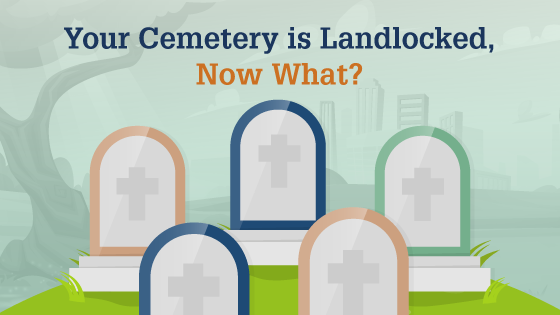Unless you have an infinite supply of unused land, then there will come a time when your cemetery runs out of space for burials–this is especially true if your cemetery is landlocked. Naturally, approaching this limit is cause for concern. After all, if you no longer have space for plots, then that could pose a big problem for the families you serve.
Luckily, there are some clever ways to ensure continued business––short of purchasing additional land. From augmenting your existing space with mausoleums to emphasizing alternatives to traditional burials, you can make the most of finite space.
Consider Mausoleums
While the term mausoleum often conjures up images of grand structures and opulent burials, a mausoleum can refer to any freestanding structure––of any size––used for burials. Most often built above-ground, mausoleums are widely considered a more ecologically friendly option because they allow for more efficient use of space than traditional burials.
Additionally, it’s important to note that mausoleums can also be used to house cremated remains.
For the average American cemetery, you might want to consider the following types of mausoleums:
- Public mausoleums: Sometimes referred to as community mausoleums, public mausoleums are generally large above-ground structures that house the remains of anyone who wishes to be entombed within. Generally more affordable than private mausoleums, this option also might offer decor elements such as name plaques and vases for the placement of flowers or other tokens of affection.
- Family mausoleums: Also known as private mausoleums, family mausoleums are used to house the remains of specific families. Smaller than public mausoleums, this variety is ideal for those who wish to be close to their loved ones, even after their passing.
- Garden mausoleums: Unlike family and public mausoleums, which are structures with indoor areas, garden mausoleums are entirely outdoors. That said, outdoor mausoleums often feature a more inventive architectural design that melds with the surroundings.
Regardless of the type of mausoleum you elect to implement, they’ll allow you to maximize your usage of space and, in some cases, create an additional revenue stream.
Provide Alternative Options
With cremations growing in popularity compared to traditional burials, it would behoove any funeral director or cemetery owner to incorporate cremation packages into their services. On top of this, alternative burial arrangements are growing in popularity, offering ample opportunity beyond burials.
In addition to traditional cremations, you might want to consider:
- Biodegradable urns: Unlike traditional cremations, in which you bury or otherwise store the cremated remains, biodegradable urns offer a green alternative. Biodegradable or living urns use cremated remains to spur the growth of a plant, most often a tree. For many people, the growth of a tree provides them with a lasting and near-permanent memory of their loved ones.
- Aquamation: We generally think of cremation as a process of burning. Aqua cremation (also known as aquamation or alkaline hydrolysis) liquefies human remains in a mixture of potassium hydroxide and water. This method uses less energy than traditional cremation, and it returns the water remains to the water supply, giving families the remaining bones, which are turned to ash.
- Human composting (Natural Organic Reduction): While the name may turn off some families, human composting or recomposting takes unembalmed remains and turns them into soil. Similar to biodegradable urns, the resulting soil is often used to grow a tree or other sentimental plant. For those uninterested in traditional gravesites, human composting is seen as a beautiful and green way to honor their loved ones.
Outsource
Alternative arrangements aside, another option might be to make agreements with other cemeteries in your area. This way, when you no longer have space, you can still provide options to those who want it.
When you notice your existing space growing scarce, this is a good option to explore, as it ensures you’ll still be able to provide assistance to those who want traditional burials.
What’s Best For Your Funeral Home
While many think of death care as a staid profession, the data shows that the ways in which people prefer to honor their loved ones are rapidly changing. A more secular population, a consciousness of eco-friendliness, and an embracing of new traditions are all contributing to a rapidly changing profession. To help ensure your cemetery can stay on top of current trends, you’ll want to seek the help of death care experts.
Composed of lifetime funeral and cemetery professionals, Johnson Consulting Group has a team of experts who can help. Whether your cemetery is running out of space or you’re looking to branch out into additional services and practices, their team of death care consultants can conduct a holistic examination of your funeral business. From there, they can assess which strategies might help improve your bottom line.
EVOLVE YOUR BUSINESS